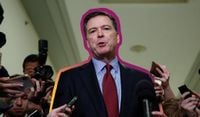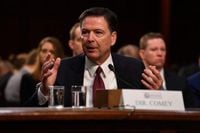In a dramatic turn of events that has gripped Washington, the recent indictment of former FBI Director James Comey has ignited fierce debate over the boundaries of justice, presidential power, and the pursuit of political vendettas. The episode, unfolding in the Eastern District of Virginia, has become a lightning rod for controversy, with legal experts, political commentators, and former insiders weighing in on what some describe as an unprecedented weaponization of the Department of Justice.
On September 25, 2025, Lindsey Halligan, freshly appointed as the interim U.S. attorney for the Eastern District of Virginia by President Donald Trump, presented a two-count indictment against Comey to a federal judge in Alexandria. The charges—one count of willfully and knowingly making materially false statements to Congress and another of obstructing a congressional proceeding—stem from Comey's 2020 testimony regarding his authorization of anonymous sources in news stories about the FBI’s investigations into Hillary Clinton and the Clinton Foundation.
The proceedings quickly descended into confusion. According to Politico, Judge Lindsey Vaala was handed two versions of the indictment, both signed by the grand jury foreperson, but inconsistent with each other. Halligan, a defense lawyer with no prosecutorial experience, admitted she had "only reviewed" one of the indictments and was unaware of the other—despite her signature appearing on both documents. When confronted by the judge, Halligan appeared flummoxed, simply responding, "OK. Well." The judge remarked, "This has never happened before. I've been handed two documents that are inconsistent with one another. There seems to be a discrepancy. They're both signed by the [grand jury] foreperson."
The confusion was compounded by the rare rejection of a third count by the grand jury, a move almost unheard of in federal prosecutions. In 2016, for context, U.S. attorneys opened around 152,000 cases, with only six ending in a "no bill" from a grand jury, according to a Justice Department report. That Halligan, in her haste, submitted two contradictory grand jury reports only deepened the sense of procedural chaos.
Behind the scenes, the decision to indict Comey was fraught with skepticism. Career prosecutors, as well as Halligan’s predecessor Erik Siebert, doubted there was sufficient evidence to move forward. Top Justice Department officials, including Attorney General Pam Bondi and Deputy Attorney General Todd Blanche, were also reportedly hesitant. Yet, President Trump was adamant. As reported by Politico, Trump declared on Truth Social, "We can't delay any longer. It's killing our reputation and credibility. They impeached me twice, and indicted me (5 times!), OVER NOTHING. JUSTICE MUST BE SERVED, NOW!!!"
Trump’s sense of urgency led to Siebert’s ouster and Halligan’s installation. Halligan had previously served on Trump’s personal defense team, and her appointment was seen by many as a clear signal of the president’s desire to pursue his perceived enemies. Trump publicly described Halligan as "a really good lawyer," though her courtroom performance suggested otherwise.
After the indictment was announced, Trump wasted no time in gloating. He called Comey "one of the worst human beings this Country has ever been exposed to," "A DIRTY COP," and "a total SLIMEBALL!" He also thanked FBI Director Kash Patel and "the outstanding members of the FBI" for their work on the indictment, stating, "the level of enthusiasm by the FBI was incredible." Speaking to reporters, Trump added, "James Comey essentially was a Democrat. He was worse than a Democrat." None of these insults, of course, are actual crimes, and the indictment itself does not allege corruption or abuse of power—just the disputed congressional testimony.
The legal case is complicated by conflicting accounts involving former FBI Deputy Director Andrew McCabe. McCabe, in 2016, authorized the disclosure of information about an FBI probe of the Clinton Foundation to The Wall Street Journal and later claimed he had informed Comey. The Justice Department’s Office of the Inspector General (OIG) ultimately sided with Comey, concluding that "McCabe did not tell Comey on or around October 31 (or at any other time) that he (McCabe) had authorized the disclosure." The OIG added, "had McCabe done so, we believe that Comey would have objected to the disclosure."
Despite these findings, the indictment alleges that Comey lied to Congress when he denied authorizing anyone to be an anonymous source in news stories about the FBI’s investigations. Yet, as legal analyst Andrew C. McCarthy told National Review, "This is the kind of thing that should never ever happen.…This case should never go to trial because it's obvious from the four corners of the indictment that there's no case." McCarthy further criticized the indictment as "vindictive," "ill-conceived," and "incompetently drafted."
Legal experts say Comey’s defense team may attempt to have the charges dismissed on the grounds of selective or vindictive prosecution—a legal maneuver that is rarely successful. According to CNN, both Trump and Hunter Biden have recently failed with similar tactics. However, retired federal Judge John Jones noted, "It’s a better case for Comey, because the president won’t shut up.…he’s got a fighting chance, I think, on vindictive prosecution." Judge Shira Scheindlin added, "It’s clearly vindictive. It’s clearly his enemies list."
Comey’s attorney, Patrick Fitzgerald, stated that his client denies the charges and looks forward to "vindicating him in the courtroom." Comey is expected to be arraigned on October 9. The burden for a successful motion to dismiss based on selective prosecution is high; defendants must prove they were singled out for improper reasons, such as political views, and that others in similar situations were not prosecuted. Vindictive prosecution claims, meanwhile, require evidence that the government is retaliating for the exercise of legal rights.
Adding fuel to the fire, former Trump attorney Michael Cohen accused Comey of criminal conduct during a September 28 interview on MSNBC’s The Weekend Primetime. Cohen, who has himself admitted to campaign finance violations and fraud, claimed that an investigation he conducted with reporter Brian Karem uncovered Comey’s "unfavorable involvement" in the Russia probe. "Chances are this DOJ has every single email, every text message, every communication. I believe likely he will be found guilty," Cohen asserted. He added, "I believe likely he committed a crime. I don't know what that crime is, but there are hundreds of thousands of documents, and the government has each and every one of them. I've been through this system. I know better than anybody what a weaponized DOJ looks like and feels like. It is insurmountable." These claims, however, remain unsubstantiated and have not been corroborated by independent sources.
The broader implications of this case extend far beyond the fate of James Comey. As CNN reported, the episode is emblematic of a larger pattern: the president’s public pressure on the Justice Department to pursue political adversaries, the replacement of career prosecutors with loyalists, and the erosion of the traditional independence of federal law enforcement. Legal experts warn that such actions set off "all kinds of red flags," as former federal prosecutor Randall Eliason put it, and risk undermining public trust in the justice system.
As the legal battle moves forward, all eyes will be on the courtroom—and on the ongoing tug-of-war between justice and politics in the United States.



